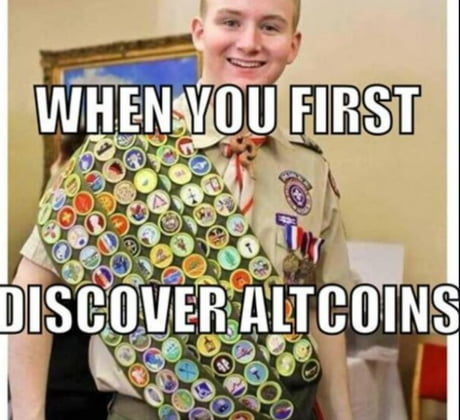If you’ve dipped your toes into the cryptocurrency market, you’ve probably heard about altcoins. In short, that is what we call any coin besides the undisputed king of the crypto world- Bitcoin. The term is a portmanteau of “alternative” and “coin” and was coined (pun intended) to differentiate these alternative digital assets from Bitcoin.
Altcoins offer a range of unique features and use cases that set them apart from Bitcoin. In this article, we’ll take a deep dive into the world of altcoins, uncovering their types, unique features, use cases, and even key considerations for investing in them. Let’s get started!

Birth of Altcoins
The altcoin lineage traces back to 2011, with Namecoin proudly donning the “first altcoin” badge. Since then, thousands of other projects have mushroomed, each touting unique features and promising to be the next Bitcoin or, at the very least, offer something Bitcoin can’t. Thanks to the introduction of new altcoins, we now have the magical world of cryptosphere.
Read more: Bitcoin Chronicles: The Epic Saga of Digital Currencies and Its Influence on Money Matters
Types of Altcoins
Altcoins come in various shapes and sizes, each serving a different purpose. Let’s explore some of the most common types:
1. Stablecoins
Stablecoins are a type of altcoin that aims to provide stability in an otherwise volatile cryptocurrency market. These coins are often pegged to a stable asset, such as a fiat currency like the US Dollar. The idea behind stablecoins is to offer the benefits of cryptocurrencies, like fast transactions and decentralization, while minimizing the price fluctuations that plague other digital currencies. Some examples to stablecoins are USDT, BUSD, and USDC.
2. Privacy Coins
Privacy coins, as the name suggests, focus on enhancing the privacy and anonymity of cryptocurrency transactions. These altcoins employ advanced cryptographic techniques to obfuscate transaction details, making it difficult to trace the flow of funds. Privacy coins offer individuals a level of financial privacy that traditional financial systems often lack. Examples include XMR and ZEC.
3. Utility Tokens
Utility tokens are altcoins that are designed to have specific uses within a particular ecosystem. They are typically issued by blockchain projects and provide access to the project’s products or services. Utility tokens are used to incentivize users, facilitate transactions, or grant voting rights within the ecosystem. BNB, BAT and CSPR can be given as examples to utility tokens.
4. Security Tokens
Security tokens represent ownership or participation in a real-world asset, such as shares in a company or real estate. Unlike utility tokens, security tokens are subject to securities regulations and offer investors ownership rights or the potential for profit-sharing. NEXO, BCAP, and TZROP are among the prominent security tokens.
5. Exchange Tokens
Exchange tokens, also known as cryptocurrencies, are primarily designed to be used as a medium of exchange. Bitcoin is the most famous example of an exchange token, but there are many others with unique features and use cases. UNI, KCS, HT, CRO and even BNB can be considered as exchange tokens.
Unique Features and Use Cases of Altcoins

Overcoming the Limitations of Bitcoin
Many altcoins were crafted with the express intention of addressing Bitcoin’s shortcomings. Because let’s face it, amazing as it is, Bitcoin is not perfect and there is some room for improvement. For instance, Litecoin, an altcoin, boasts faster transaction times and a different consensus mechanism compared to Bitcoin.
The Power of Smart Contracts
Altcoins such as Ethereum have revolutionized the crypto space with their innovative smart contract capabilities, providing developers with tools to build decentralized applications on the blockchain. These digital contracts, self-executing with the terms directly written into code, have entirely transformed the way we conceive agreements.
Ethereum, the foremost among these, is more than just a digital currency. It serves as a platform on which developers can write, deploy, and execute smart contracts. These contracts automate transactions without the need for a central authority or middleman. It’s like having a robot execute the contract, leaving no room for bias, error, or manipulation.
Read more: Cryptocurrency: Key Terms and Concepts
Enhanced Privacy and Anonymity
Some altcoins, known as “privacy coins”, are specifically designed to provide heightened levels of privacy and anonymity, making transactions nearly untraceable. This advanced feature allows these coins to outshine Bitcoin’s pseudo-anonymity, pushing the envelope for what financial privacy can look like in the digital realm.
Notable examples of these privacy coins include Monero (XMR) and Zcash (ZEC). Monero uses ring signatures and stealth addresses to obscure transaction details, whereas Zcash offers the option to shield transaction details through its innovative zero-knowledge proof concept, known as zk-SNARKs.
However, many other altcoins don’t have this level of privacy. For instance, Ethereum, while it does offer greater functionality and flexibility than Bitcoin through its smart contracts, does not inherently provide enhanced privacy or anonymity for standard transactions.
Similarly, utility tokens like Binance Coin (BNB) or exchange tokens like Uniswap’s UNI, while they have specific use cases and advantages, do not primarily focus on user privacy or anonymity.
Therefore, while some altcoins do offer enhanced privacy features, it’s not accurate to say that all altcoins inherently provide a higher level of privacy or anonymity than Bitcoin. It largely depends on the specific design and purpose of the individual altcoin.
Read more: Cryptocurrency Security or How to Protect Yourself Against Cyber Threats
Key Considerations for Investing in Altcoins
Investing in altcoins can feel like traversing a minefield.Here are a few key considerations you need to bear in mind before venturing into this arena:
Understand the Market Dynamics: Altcoin prices are volatile and can be influenced by a variety of factors, including the broader market sentiment, market trends, and the economic environment. Understanding these dynamics can help investors make more informed decisions.
Consider the Use Case: Each altcoin has its own unique purpose and function. Some altcoins are geared towards enhancing privacy, some enable smart contracts, and others provide a platform for decentralized finance (DeFi). Considering the unique use case of an altcoin can provide insight into its potential for growth and adoption.
Regulatory Environment: RThe regulatory landscape for cryptocurrencies is continually evolving. Regulation is especially crucial for altcoins, including stablecoins, which could impact national security and global trade. Before investing, it is important to understand the regulatory environment and potential regulatory risks associated with the altcoin. This could influence its future viability and value.
Risks and Challenges: Each altcoin comes with its unique set of risks and challenges. These can range from technological vulnerabilities to market volatility and regulatory changes. Due diligence and a thorough understanding of these risks are necessary before investing.
Prominent Altcoins and Their Use Cases
Let’s meet some of the headline-grabbers in the altcoin universe, each with its unique powers and mission.

Ethereum (ETH)
Ethereum is a global, open-source platform for decentralized applications. Its primary innovation is the Ethereum Virtual Machine (EVM), a Turing complete software that allows anyone to run a program, regardless of the programming language given enough time and memory.
Ethereum’s native cryptocurrency, Ether (ETH), operates as the fuel for the Ethereum network. It’s used to pay for transactions and computational services on the network. For developers, ETH is required to build and run applications on Ethereum. For users, ETH can be traded as a digital currency or used to participate in, or interact with, applications.
Binance Coin (BNB)
Binance Coin is the native currency of the Binance Chain developed by Binance, the gian.t With the introduction of the Binance Smart Chain, BNB also acquired multiple functionalities such as staking, paying for transaction fees on Binance.com, and participating in token sales on the Binance Launchpad. Binance Smart Chain is EVM-compatible, allowing for interoperability and programmability, and it also supports cross-chain transfers and communication with the Binance Chain.
Cardano (ADA)
Cardano is a groundbreaking proof-of-stake blockchain network, being developed into a decentralized application (DApp) development platform with a multi-asset ledger and verifiable smart contracts. It’s the first blockchain platform to evolve out of a scientific philosophy and a research-first driven approach, and it’s designed to provide security and scalability through its unique two-layer architecture
ADA is the native token of the Cardano platform, used to power its activities. ADA owners can stake their coins in the Cardano network, participating in the operation of the network. Because every transaction in Cardano requires ADA, and because the platform can be used to issue new cryptocurrencies, ADA has a wide range of potential use cases.
Polkadot (DOT)
Polkadot is a network protocol that allows arbitrary data—not just tokens—to be transferred across blockchains. This means Polkadot is a true multi-chain application environment where things like cross-chain registries and cross-chain computation are possible. Polkadot can transfer this data across public, open, permissionless blockchains as well as private, permissioned blockchains.
DOT serves three clear purposes: network governance and operations, and creating parachains by bonding DOT. DOT holders have the ability to influence the network’s protocol, its upgrades and changes, through a democratic governance system. They also manage exceptional events such as protocol upgrades and fixes.
Chainlink (LINK)
Chainlink is a decentralized oracle network that connects smart contracts on any blockchain to real-world data and external resources. This enables blockchain to interact with off-chain systems securely, bringing functionalities like price data, randomness, automation, and external API integration. Chainlink powers various applications in the DeFi sector and beyond, ensuring reliability and security. It provides developers with a comprehensive set of resources, enabling the creation of sophisticated dApps that can securely interact with the real world.
LINK is Chainlink’s native ERC-677 token, used to pay for services within the ecosystem. Chainlink nodes require LINK to operate and the tokens are used as part of the reputation system. In addition, users can stake LINK tokens to incentivize accurate data provision.
The Future Potential of Altcoins in the Cryptocurrency Landscape

It’s clear that altcoins, with their diverse features and applications, are no longer in the shadow of Bitcoin. No longer do they simply orbit Bitcoin; they now forge their own paths.
From innovative platforms for decentralized applications to enabling democratic network governance, from powering global remittances to tokenizing the world of art, these altcoins are more than just digital assets – they are transformative tools that are redefining our financial and digital infrastructure. They hold the promise to democratize access to financial services, enhance privacy and security, and usher in a new era of decentralization.
However, as we venture into this exciting world of altcoins, it’s important to balance enthusiasm with informed decision-making. The cryptosphere is as vast as it is volatile, and it demands not just our attention but also our discernment. “To the moon” might be the rally cry, but remember, even astronauts need careful preparation and navigation tools.
Disclaimer: All materials on this site are for informational purposes only. None of the material should be interpreted as investment advice.Please note that despite the nature of much of the material created and hosted on this website, HODL.FM is not a financial reference resource and the opinions of authors and other contributors are their own and should not be taken as financial advice. If you require advice of this sort, HODL.FM strongly recommends contacting a qualified industry professional.
